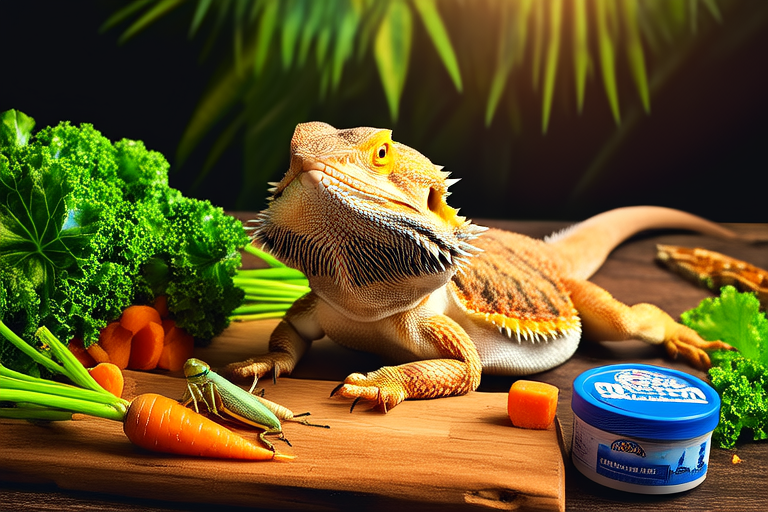Bearded Dragon Diet: The Secret Ingredients for a Healthy Pet!
Welcome to the wonderful world of bearded dragon ownership! These charismatic reptiles have become increasingly popular pets, and it’s no wonder why. With their unique personalities and striking appearance, they bring joy and fascination to many homes. However, like any pet, proper care is crucial to ensure their well-being. One of the most important aspects of bearded dragon care is their diet. In this article, we will explore the essential nutrients, ideal food types, hydration, supplementation, common feeding mistakes, and how diet impacts overall health, growth, and longevity. We’ll also provide tips for beginners and debunk some common myths.
Essential Nutrients for Bearded Dragons
Bearded dragons require a balanced diet rich in various nutrients to thrive. Their diet should include proteins, calcium, vitamins, and minerals. Proteins are vital for muscle development and repair, while calcium is essential for bone strength and overall health. Vitamins and minerals support immune function, metabolism, and other bodily processes. A lack of these nutrients can lead to health issues such as metabolic bone disease, which can be painful and debilitating.
Ideal Food Types: Insects and Vegetation
Bearded dragons are omnivores, meaning they eat both plant and animal matter. The ideal diet consists of a mix of insects and vegetation. For younger dragons, protein-rich insects like crickets, dubia roaches, and superworms should make up the majority of their diet. As they age, you can gradually increase the amount of vegetation in their meals.
- Insects: Crickets, dubia roaches, and superworms are excellent sources of protein. Feed them live insects that are appropriately sized for your dragon’s mouth. Avoid mealworms, as they are difficult for bearded dragons to digest.
- Vegetation: Offer a variety of leafy greens, including collard greens, dandelion greens, and mustard greens. Also, include vegetables like squash, carrots, and bell peppers. Avoid feeding them iceberg lettuce, as it lacks nutritional value.
Hydration: Keeping Your Bearded Dragon Hydrated
Water is essential for all living beings, including bearded dragons. While they don’t drink water as frequently as mammals, they still need access to fresh, clean water daily. Provide a shallow water dish that is easy for them to reach. Additionally, misting their enclosure can help maintain humidity levels and encourage drinking. Some bearded dragons may also enjoy taking short baths, which can aid in shedding and provide a source of hydration.
Supplementation: Ensuring Nutritional Balance
Even with a varied diet, bearded dragons may still require supplements to ensure they receive all necessary nutrients. Calcium and vitamin D3 are particularly important, as they help with bone development and calcium absorption. Dust your insects with a high-quality calcium supplement without vitamin D3 two to three times per week. On the remaining days, use a calcium supplement with vitamin D3. Avoid over-supplementing, as excessive amounts can lead to toxicity.
Common Feeding Mistakes to Avoid
Despite best intentions, even experienced owners can make mistakes when feeding their bearded dragons. Here are some common errors to avoid:
- Overfeeding: Bearded dragons have a tendency to overeat if given the opportunity. Overfeeding can lead to obesity and related health problems. Stick to a consistent feeding schedule and monitor portion sizes.
- Feeding inappropriate insects: Avoid feeding mealworms, as mentioned earlier, and be cautious with feeder insects that are too large or too small. Insects should be appropriately sized for your dragon’s mouth and digestive system.
- Not providing enough variety: A monotonous diet can lead to nutritional deficiencies. Offer a wide range of insects and vegetation to ensure a balanced intake of nutrients.
The Impact of Diet on Overall Health, Growth, and Longevity
A well-balanced diet plays a crucial role in the overall health, growth, and longevity of bearded dragons. Proper nutrition supports strong bones, healthy skin, and a robust immune system. It also promotes optimal growth rates and helps prevent developmental issues. By providing the right foods and supplements, you can extend your bearded dragon’s lifespan and ensure they live a happy, healthy life.
Tips for Beginners
If you’re new to bearded dragon ownership, here are some tips to help you get started:
- Research thoroughly: Before bringing your bearded dragon home, learn about their dietary needs, habitat requirements, and behavior patterns. Understanding their care needs will help you provide the best possible environment.
- Consult a veterinarian: Find a reptile-savvy veterinarian who can offer guidance on proper nutrition, supplementation, and overall health care. Regular check-ups can catch potential issues early and ensure your dragon remains healthy.
- Start with a balanced diet: Begin by offering a mix of appropriately sized insects and a variety of leafy greens. Gradually introduce new foods to expand their palate and ensure they receive a wide range of nutrients.
Myths Debunked
There are several misconceptions surrounding bearded dragon diets. Let’s address some of the most common ones:
- Myth: Bearded dragons only eat insects. While young bearded dragons require more protein from insects, adults benefit from a diet that includes a significant portion of vegetation. A balanced diet is key to their overall health.
- Myth: Bearded dragons don’t need water. Although they don’t drink water as frequently as mammals, bearded dragons still require access to fresh, clean water daily. Providing a shallow water dish and misting their enclosure can help maintain hydration.
- Myth: All insects are good for bearded dragons. Not all insects are safe or nutritious for bearded dragons. Avoid mealworms and stick to appropriately sized, nutrient-rich insects like crickets, dubia roaches, and superworms.
Conclusion
Proper nutrition is essential for the health, growth, and longevity of bearded dragons. By understanding their dietary needs and providing a balanced mix of insects and vegetation, along with appropriate supplementation and hydration, you can ensure your bearded dragon thrives. Remember to avoid common feeding mistakes and consult a veterinarian for personalized advice. With the right care and attention, your bearded dragon will lead a long, healthy, and fulfilling life. Happy feeding!
